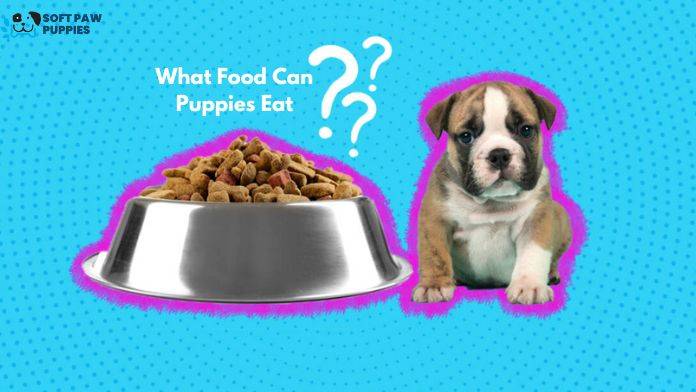
Bringing a new puppy into your home is an exciting and joyous occasion. Responsible pet owners must provide a balanced and nutritious diet to support their development. This article aims to guide you on what food can puppies eat, ensuring you make informed choices about what food is safe and healthy for them to eat.
Importance of Proper Nutrition for Puppies
Proper nutrition plays a crucial role in puppies’ overall health and well-being. During this stage, puppies require a well-balanced diet to support their rapid growth, strong bones, and a healthy immune system. A nutritious diet also contributes to their cognitive development and aids in preventing certain health conditions in the long run.
Puppy’s Nutritional Requirements
Puppies have specific nutritional requirements that differ from adult dogs. They need more protein, fats, vitamins, and minerals to fuel their growth. To Complete and balanced puppy food should contain appropriate nutrients, including essential amino acids, to support their optimal development and learn about what food can puppies eat.
Best Foods for Puppies
When choosing the best food for your puppy, choose high-quality commercial food specifically formulated to meet their nutritional needs. Look for reputable brands that use real meat as the primary ingredient and avoid those with artificial additives or fillers. These foods are designed to provide all the necessary nutrients in the right proportions.
Commercial Puppy Food vs. Homemade Diets
Commercial puppy food is carefully formulated to meet the specific dietary needs of puppies. It undergoes rigorous testing and adheres to industry standards to ensure its quality and safety. While some pet owners prefer homemade diets, achieving the right balance of nutrients can be demanding without professional guidance. If you choose to prepare homemade meals for your puppy, consult a veterinarian or a veterinary nutritionist to ensure they receive all the necessary nutrients.
Human Foods That Are Safe for Puppies
Although puppies primarily require a commercial puppy diet, certain human foods can be safely incorporated into their meals as occasional treats or additions. These include cooked lean meats like chicken or turkey, plain yoghurt, pumpkin, blueberries, and carrots. However, it’s crucial to introduce new foods gradually and in moderation, ensuring they don’t upset your puppy’s delicate digestive system.
Foods to Avoid Giving to Puppies
While some human foods are safe for puppies, several foods should be strictly avoided due to their potential toxicity. These include chocolate, onions, garlic, grapes, raisins, avocados, caffeine, alcohol, and any food containing artificial sweeteners like xylitol. These foods can cause serious health issues and should always be kept away from your puppy.
Transitioning Between Diets
If you switch your puppy’s food, it’s important to do so slowly to avoid digestive upset. Start by mixing a small amount of the new food with the old food, gradually increasing the proportion of the new food over several days. This allows your puppy’s digestive system to adjust to the change without causing any discomfort.
Feeding Schedule for Puppies
Establishing a consistent feeding schedule is essential for puppies. They thrive on routine, and a regular feeding schedule helps regulate their metabolism and prevents overeating. Divide their daily food allowance into several small meals throughout the day, gradually reducing the number of meals as they mature.
Tips for Feeding Picky Eaters
Some puppies can be picky eaters, making it challenging to ensure they receive adequate nutrition. If your puppy is a fussy eater, try the following tips:
- Serve the food at room temperature.
- Avoid leaving food out for extended periods.
- Offer a variety of flavours and textures.
- Avoid feeding table scraps or excessive treats.
Common Dietary Issues in Puppies
Puppies may experience certain dietary issues that require attention. These can include food allergies, sensitive stomachs, or digestive problems. If you notice any symptoms such as diarrhoea, vomiting, or excessive flatulence, consult your veterinarian for a proper diagnosis and guidance on the best course of action.
Signs of Food Allergies in Puppies
Food allergies can manifest in puppies through various symptoms, including itching, rashes, gastrointestinal upset, or chronic ear infections. If you doubt your puppy has a food allergy, consult your veterinarian to determine the allergen and identify appropriate dietary changes or elimination diets to alleviate their symptoms.
Understanding Puppy Treats
Treats play a vital role in puppy training and can be used as rewards for good behaviour. When selecting treats, opt for small, soft, and easily digestible options for puppies. Avoid treats high in fat, salt, or artificial additives, as they can negatively impact your puppy’s health.
Introducing New Foods to Puppies
When introducing new foods to your puppy, it’s important to do so gradually. Start by offering small amounts of the new food alongside their regular diet, monitoring their response and digestion. If your puppy shows any signs of sensitivity or digestive upset, consult your veterinarian before continuing.
Water Consumption for Puppies
Proper hydration is essential for puppies overall health. Always provide fresh and clean water for your puppy, ensuring it’s readily available throughout the day. Monitor their water intake and contact your veterinarian if you notice any significant changes or signs of dehydration.
Exercise and Diet for Healthy Puppies
A balanced diet alone is not sufficient for a healthy puppy. Regular exercise is crucial to maintain their physical fitness and mental well-being. Engage in age-appropriate activities with your puppy, such as short walks, playtime, and interactive toys, ensuring they receive the necessary exercise to burn off excess energy.
Conclusion
Ensuring your puppy receives a nutritious and well-balanced diet is vital for their growth and overall health. Following the guidelines in this article, you can be informed about what food can puppies eat. Remember to consult your veterinarian for personalized advice and recommendations based on your puppy’s needs.






